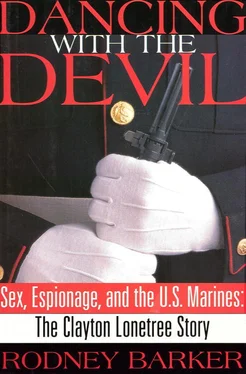Rodney Barker - Dancing with the Devil - Sex, Espionage and the U.S. Marines - The Clayton Lonetree Story
Здесь есть возможность читать онлайн «Rodney Barker - Dancing with the Devil - Sex, Espionage and the U.S. Marines - The Clayton Lonetree Story» весь текст электронной книги совершенно бесплатно (целиком полную версию без сокращений). В некоторых случаях можно слушать аудио, скачать через торрент в формате fb2 и присутствует краткое содержание. Город: New York, Год выпуска: 2014, ISBN: 2014, Издательство: Simon and Schuster, Жанр: История, Биографии и Мемуары, на английском языке. Описание произведения, (предисловие) а так же отзывы посетителей доступны на портале библиотеки ЛибКат.
- Название:Dancing with the Devil: Sex, Espionage and the U.S. Marines: The Clayton Lonetree Story
- Автор:
- Издательство:Simon and Schuster
- Жанр:
- Год:2014
- Город:New York
- ISBN:0-684-81099-9
- Рейтинг книги:5 / 5. Голосов: 1
-
Избранное:Добавить в избранное
- Отзывы:
-
Ваша оценка:
Dancing with the Devil: Sex, Espionage and the U.S. Marines: The Clayton Lonetree Story: краткое содержание, описание и аннотация
Предлагаем к чтению аннотацию, описание, краткое содержание или предисловие (зависит от того, что написал сам автор книги «Dancing with the Devil: Sex, Espionage and the U.S. Marines: The Clayton Lonetree Story»). Если вы не нашли необходимую информацию о книге — напишите в комментариях, мы постараемся отыскать её.
Although national security issues made the case an instant sensation—at one point government officials were calling it “the most serious espionage case of the century”—the human element gave it an unusual pathos, for it was not just secret documents that were at issue, but love, sex, marine pride, and race It began when a Native American marine sergeant named Clayton Lonetree, who was serving as a marine security guard at the American embassy in Moscow, fell in love with a Russian woman, who then recruited him as a spy for the KGB. Soon the story expanded to involve the CIA, diplomats on both sides of the Iron Curtain, and the United States Navy’s own investigative service, and before it was over a witch hunt would implicate more marines and ruin many reputations and careers.
In the end, charges were dropped against everyone except Lonetree, who after a long and dramatic court-martial was sentenced to thirty years in prison. But so many questions were left unanswered that the scandal would be thought of as one of the great unsolved mysteries of the Cold War.
Not any longer. In the process of researching his book, investigative writer Rodney Barker gained access to all the principal characters in this story. He interviewed key U.S. military and intelligence personnel, many of whom were unhappy with the public records and trial, and spoke out with astonishing candor. He traveled to Russia to track down and interview KGB officers involved in the operation, including the beautiful and enigmatic Violetta Seina, who lured Lonetree into the “honey-trap”—only to fall in love with him. And he succeeded in penetrating the wall of silence that has surrounded Clayton Lonetree since his arrest and reports the sergeant’s innermost thoughts.
A provocative aspect of this story that Barker explores in depth is whether justice was served in Lonetree’s court-martial—or whether he was used as a face-saving scapegoat after a majority security failure, or doomed by conflicts within his defense team, between his military attorney and his civilian lawyer William Kunstler, or victimized by an elaborate and devious KGB attempt to cover the traces of a far more significant spy: Aldrich Ames, the “mole” at the very heart of the CIA.
Above all, this is a book about Clayton Lonetree, one man trapped by his own impulses and his upbringing, in the final spasms of the Cold War, a curiously touching, complex, and ultimately sympathetic figure who did, in fact, sacrifice everything for love.












